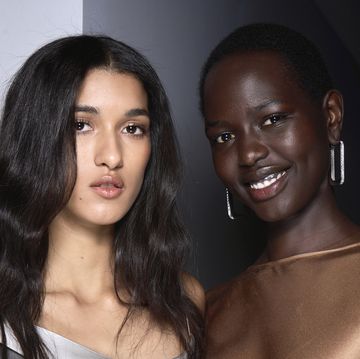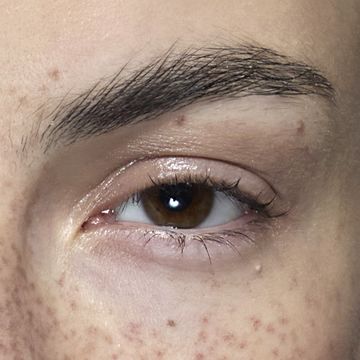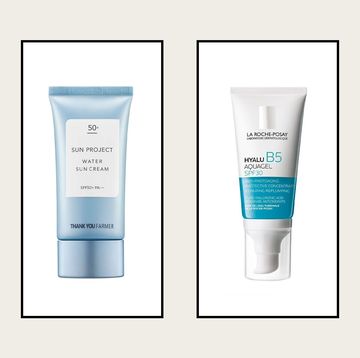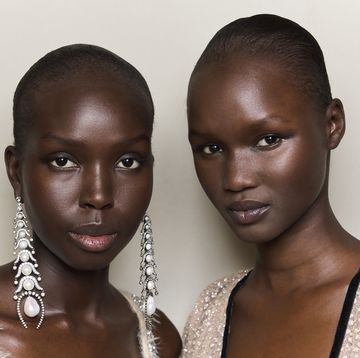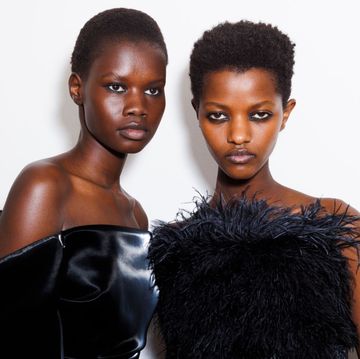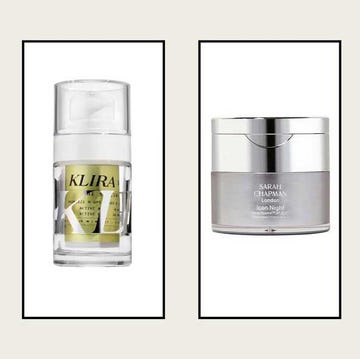There was a time, not too long ago, when retinol could do no wrong. A gold standard ingredient, it was loved by dermatologists, the talk of TikTok and the unwavering fascination of the beauty world.
But thanks to new legislations that could change the face (and potency) of this long-loved 'anti-ageing' hero, not to mention the irritation often synonymous with it, this skincare stalwart has fallen somewhat out of favour. And as a result it's giving rise to its lesser-known sister, aka, retinal.
FIND OUT MORE ON ELLE COLLECTIVE
Also part of the retinoid family, retinal is finally enjoying a moment in the spotlight. So much so, Google searches for ‘Retinal’ have increased by 73% in the last year, according to the Boots Beauty Trend Report 2024. And with so many skincare benefits, from boosting radiance to improving fine lines, it's pretty easy to see why.
So what is retinal?
To understand how retinal works, it's important to nail the retinoid basics first. 'Retinol, retinal and retinoic acid (also known as tretinoin) are all part of a family of molecules called retinoids,' explains Skin+Me dermatologist, Dr Beibei Du-Harpur. 'These are important molecules in the development and maintenance of many tissues in the human body, and coordinate how tissues renew themselves.'
As skin expert, doctor and pharmacist Dr Christine Hall explains, in order for each retinoid to work it must be converted in the skin to retinoic acid. 'The fewer the number of steps required to convert the retinoid into retinoic acid, the stronger it will be,' she shares. 'Retinoic acid is already in its active form and requires no conversion, hence it is the strongest and in the UK is only available on prescription.' (In fact, it's 20 times more powerful than retinol.)
But this is where it gets interesting – retinal is also more potent than your beloved retinol. 'Because retinal requires one less conversion step than retinol, it is thought to be generally stronger than retinol,' shares Dr Du-Harpur. 'Retinaldehyde or retinal is the immediate precursor to retinoic acid or tretinoin, which is the form of retinoid that exerts an effect on cells.' As such, retinal is actually the strongest form of vitamin A that you can buy over the counter and without a prescription.
What are the skincare benefits?
There are a ton of skincare benefits of note too. 'Retinal is a skincare powerhouse that can improve the appearance of fine lines, wrinkles, discolouration, blemishes, and pores by accelerating cellular turnover and encouraging collagen production,' shares Mariam Hakimi, a skincare expert and pharmacist at Boots Beauty.
Dr Hall agrees: ‘Retinal helps to increase turnover, collagen production and the thickness of the skin. But it's also the single best "anti-ageing" treatment out there resulting in improved skin tone, a reduction in hyperpigmentation, reduced fine lines and wrinkles and can help to reduce pore size too,' she says.
Retinal also works wonders for acne-prone skin. 'It has antibacterial properties which means it can be useful when treating acne.' Given that it works faster than retinol, not to mention it's stronger, Dr Hall describes it as a 'step up' from retinol when it comes to reducing the appearance of fine lines and wrinkles.
However, given its strength and potency, there are some drawbacks to consider too. For starters, retinal can be unstable to formulate. Though some brands use encapsulation to ensure the formula stays stable, not all products are created equal.
'This encapsulation process improves the stability and delivery of retinaldehyde to the skin. But ultimately, how effective a product is can be influenced significantly by the formulation and the technologies used to stabilise and improve delivery of an active ingredient,' says Dr Du-Harpur. 'This means that a well formulated retinol can in theory be "stronger" than a less well formulated retinal,' she adds.
What's the difference between retinol and retinal?
They might sound like kindred spirits, but actually, retinol and retinal aren't two of the same. 'Although retinal sounds similar to retinol, their molecular differences make them unique so they interact with the skin differently,' shares Dr Hall.
'They both belong to the retinoid family and are a form of Vitamin A but in terms of chemical structure, they differ by one bond and two hydrogen atoms. This means that although they’re closely related, retinal is essentially the next level up from retinol as it’s closer to the active form (retinoic acid).' And so, the main difference really is their strength. In fact, retinal is thought to act over 10 times faster on the skin than retinol, depending on the formula and product.
How to add retinal into your routine
Like all retinoids, retinal is not to be slathered onto skin or applied haphazardly. 'Most people will undergo a period of dryness, redness, and possibly soreness when they try to start retinal - it even has a name ‘retinization’ - the period during which the skin adapts and adjust to retinoid treatments,' shares Dr Hall.
Starting with a low strength is the key to success. 'Always apply only onto very dry skin (wash your face and wait 20 minutes before you apply), avoid sensitive areas near the eyes, mouth and nose and only use it once a week to start with,' she adds. After your skin gets used to the ingredient, you can then increase the application to twice a week, and then three times, and so on.
All experts warn that because retinoids can be deactivated by light so it's important to always use retinal at night and ensure you're using a high factor sunscreen the next day. 'Everyone should be using a dedicated SPF all year around regardless of the weather, but this is especially important when it comes to using retinoids as skin sensitivity will increase and this may increase the risk of pigmentation,' says Dr Hall.
Take stock of existing ingredients in your skincare routine too and don't mix and match harsh actives. 'Avoid combining with other exfoliating ingredients such as glycolic acid or salicylic acid, and instead opt for hydrating ingredients like hyaluronic acid,' shares Hakimi.
As for someone who's long been a retinol advocate, I'm slowly but surely making the switch over to retinal – and while there are pros and cons to consider, the hype is, in fact, real.
ELLE Collective is a new community of fashion, beauty and culture lovers. For access to exclusive content, events, inspiring advice from our Editors and industry experts, as well the opportunity to meet designers, thought-leaders and stylists, become a member today HERE.













